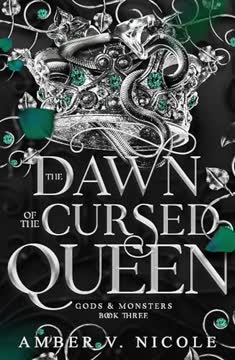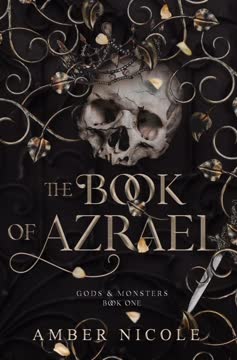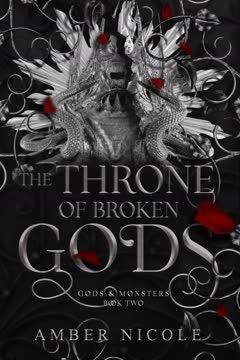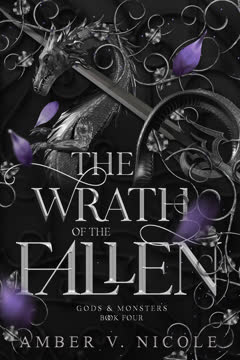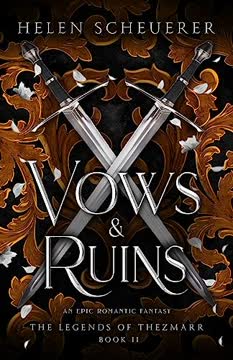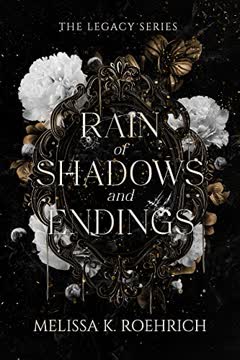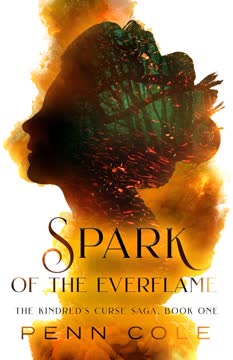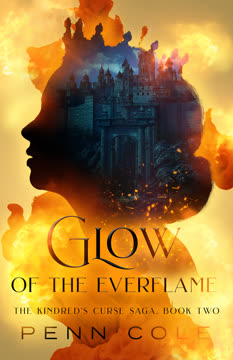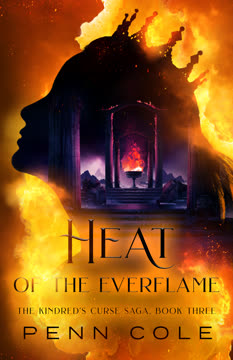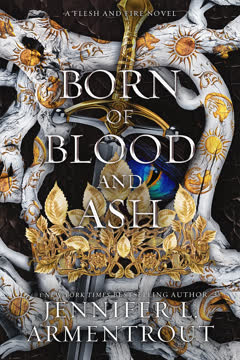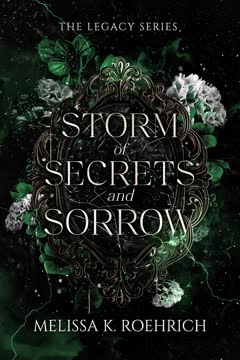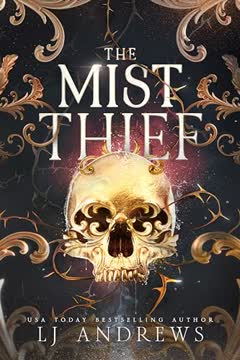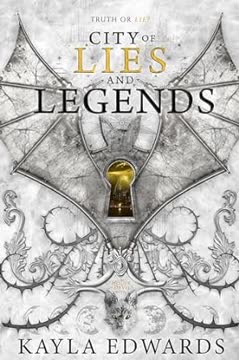Plot Summary
Shattered Crowns, Broken Bonds
The story opens in the aftermath of a devastating war among gods, monsters, and mortals. Nismera, the ruthless Goddess of War, has seized control of the realms, her power cemented by violence and fear. The old order is shattered: Samkiel, the once-hopeful God King, is believed dead, his light scattered across the sky. Dianna, his fierce amata and an Ig'Morruthen—a being of fire and vengeance—hides with him, both wounded and hunted. Their love is tested by trauma, secrets, and the threat of annihilation. The world is a patchwork of broken alliances, ruined cities, and survivors clinging to hope or vengeance. The narrative is immediately intimate and raw, focusing on the emotional fallout of betrayal and the cost of survival in a world where power is everything.
The Conqueror's New Order
Nismera consolidates her rule with brutality, executing rebels and traitors, and using her High Guards—Vincent, Kaden, and Isaiah—to enforce her will. She manipulates loyalty through fear, rewarding obedience and punishing dissent with public executions and torture. Her court is a den of monsters, witches, and broken heroes, all vying for her favor or simply to survive. The Hand, once Samkiel's elite guard, is scattered: some are enslaved, others brainwashed, and a few, like Imogen, are kept as trophies. Nismera's obsession with power drives her to seek ancient weapons and magical artifacts, including the medallion Camilla is forced to repair. The world is reshaped in her image—opulent, cruel, and always on the brink of violence.
Lovers in Hiding
In the floating city of Jade, Samkiel and Dianna attempt to heal, both physically and emotionally. Their love is passionate but fraught with guilt, secrets, and the trauma of loss. Dianna, haunted by her sister's death and her own monstrous hunger, struggles to control her powers and her need for blood. Samkiel, wounded by a god-killing spear and poisoned by traitorous healers, is slow to recover. Their intimacy is both a sanctuary and a battleground, as Dianna hides the true cost of Samkiel's resurrection—a price paid with her own soul. Their isolation is temporary; the world's dangers and their own unresolved pain threaten to tear them apart.
The Hand's Betrayal
The Hand, Samkiel's chosen family, is shattered by betrayal. Vincent, once Samkiel's second, is revealed as a traitor, manipulated by Nismera and wracked with guilt. Kaden, Dianna's former lover and creator, is obsessed with reclaiming her, willing to erase her memories to make her his again. Isaiah, the bloodthirsty brother, is both a weapon and a victim, his loyalty to family twisted by centuries of imprisonment and abuse. The Hand's members are scattered, some enslaved, others resisting, all haunted by what they've done and what's been done to them. The bonds of love, loyalty, and friendship are tested to their breaking point.
Blood and Memory
Dianna's monstrous hunger grows as she denies the truth: to bring Samkiel back from death, she sacrificed her soul. She is now hollow, her only solace found in Samkiel's arms. Their bond is deepened by shared trauma and the knowledge that their love defies fate, but it is also threatened by secrets and the fear of losing each other again. Blood becomes both sustenance and symbol—of power, of love, of the past that cannot be forgotten. The narrative explores the psychological toll of resurrection, the hunger for connection, and the pain of memory.
The Poisoned Healers
The supposed sanctuary of Jade City is revealed as a trap. The healers, under Nismera's orders, poison Samkiel and Dianna, seeking to deliver them to the goddess. Miska, a young healer, becomes an unexpected ally, helping Dianna create an antidote and escape. When Samkiel is captured and Dianna's rage is unleashed, Jade City is destroyed in a fiery cataclysm. The cost of trust is made clear: every safe haven is temporary, every kindness suspect. The world grows smaller and more dangerous as Nismera's reach extends.
The Queen's Weapon
Obsessed with securing her rule, Nismera seeks to bind the power of Oblivion—a weapon forged from the souls and blood of gods and monsters. She manipulates Camilla into repairing a medallion, believing it will allow her to control the forces that once belonged to Samkiel. Her experiments are cruel, her ambition boundless. The narrative delves into the psychology of tyranny: Nismera's need for control is rooted in old wounds, her cruelty a mask for fear. The medallion becomes a symbol of the world's brokenness and the possibility of its salvation or destruction.
The World Ender's Return
When Dianna is captured and nearly erased by Kaden and Isaiah, Samkiel's love and rage ignite. He calls his scattered power back from the sky, breaking the laws of gods and nature. The world trembles as he unleashes Oblivion, destroying entire realms to save Dianna. The legend of the World Ender is reborn—not as a monster, but as a lover willing to destroy everything for the one he loves. The cost is immense: the world is left in ruins, and every power in existence is now arrayed against them.
The Price of Resurrection
The true cost of Samkiel's resurrection is revealed: Dianna is now void, her soul split and hidden within Samkiel. She is both more and less than human, her hunger and rage barely contained. The psychological consequences are profound—she is haunted by dreams of the Otherworld, stalked by ancient powers, and feared by gods and monsters alike. The narrative explores the existential horror of being hollow, the longing for connection, and the terror of losing oneself to darkness.
The Markless Marriage
Despite the loss of their soul-bond, Samkiel and Dianna marry in a private, makeshift ceremony. Their rings, crafted by old friends, become a new symbol of their union—one not sanctioned by fate, but chosen by will. Their love is tested by guilt, fear, and the knowledge that the world is still at war. The wedding is both a moment of hope and a reminder of all that has been lost. Their union is a defiant act, a promise to fight for each other even as the world crumbles.
The Hive's Trap
As Samkiel and Dianna attempt to strike at Nismera's supply lines, they are betrayed by old friends and new enemies. Dianna is lured into a trap by Kaden and Isaiah, who attempt to erase her love for Samkiel and make her Kaden's puppet. The battle is brutal, pushing Dianna to the brink of death. Samkiel, fueled by love and rage, unleashes his full power, destroying worlds to save her. The cost is immense: the world is left in ruins, and every power in existence is now arrayed against them.
The End of Brothers
In a cataclysmic battle, Samkiel faces Kaden and Isaiah. Kaden, obsessed with reclaiming Dianna, is finally killed—his head severed, his soul lost. Isaiah is captured, broken by the loss of his brother and the realization of his own monstrosity. The old order is ended, but the wounds remain. The narrative explores the tragedy of family torn apart by ambition, love, and betrayal. The cost of victory is high: the world is left in ruins, and the survivors are haunted by what they have done.
The Soul's Hollow Echo
In a chilling conversation between Roccurem (fate) and Death, the true nature of Dianna's sacrifice is revealed. Her soul, split and hidden within Samkiel, is the only thing keeping her from becoming a monster. Death warns that if they are separated, Dianna will become a void, a force of destruction greater than any before. The narrative explores the metaphysics of love, sacrifice, and the cost of defying fate. The world teeters on the brink of annihilation, and only love holds it together.
The Fate's Bargain
As the world reels from the destruction, old friends and new allies gather. Camilla and Vincent, once enemies, become lovers and co-conspirators, plotting to escape Nismera's grasp. The Eye, the last rebellion, regroups under Kryella and Athos, preparing for war. The survivors are scarred, traumatized, and desperate, but they are united by a common enemy. The narrative explores the psychology of resistance, the bonds of found family, and the hope that survives even in the darkest times.
The Rise of Rebellion
Nismera, believing herself unassailable, crowns herself King of the Gods. Her enemies gather: Samkiel and Dianna, now married and more powerful than ever; The Eye, led by Kryella and Athos; and a host of rebels, monsters, and outcasts. The world is a patchwork of ruined cities, haunted survivors, and armies on the march. The narrative is a study in tension: every alliance is fragile, every victory costly, and the future uncertain. The stage is set for the final battle.
The Coronation of Fear
In a lavish, grotesque ceremony, Nismera crowns herself with Unir's crown, cementing her rule through spectacle and terror. The world's rulers bow, some out of fear, others out of calculation. Camilla, forced to play the part of loyal witch, plots her escape with Vincent. The narrative is a study in power: how it is wielded, how it corrupts, and how it is ultimately hollow. The coronation is both a triumph and a prelude to disaster.
The Last Sanctuary
Samkiel and Dianna, with their allies, find sanctuary in an abandoned castle. They rebuild, heal, and prepare for the coming war. Their marriage is a symbol of hope, a promise that love can survive even the end of the world. But peace is fragile: old wounds fester, new threats emerge, and the shadow of Nismera looms. The narrative is intimate and hopeful, focusing on the small moments of joy that survive even in the darkest times.
The Dead Return
In the final pages, Dianna is visited by the ghost of Unir, Samkiel's father and the former God King. He warns her that the dead have much to discuss, hinting at secrets yet to be revealed and dangers yet to come. The story ends on a note of foreboding: the world is not yet saved, and the true end is still to come.
Characters
Dianna (Ayla)
Dianna is the heart of the story—a woman forged in loss, rage, and love. Once a mortal, then an Ig'Morruthen, she is both monster and savior. Her psyche is a battlefield: she is haunted by her sister's death, her own monstrous hunger, and the knowledge that she sacrificed her soul to resurrect Samkiel. Her love for Samkiel is obsessive, self-destructive, and redemptive; it is both her greatest strength and her greatest vulnerability. She is a survivor, a protector, and a destroyer, willing to burn the world for those she loves. Her journey is one of self-acceptance, learning to trust, and the realization that love—chosen, not fated—can be more powerful than destiny.
Samkiel
Samkiel is the last true God King, a being of light, hope, and devastating power. He is defined by his compassion, his longing for peace, and his willingness to sacrifice everything for love. His resurrection by Dianna leaves him both grateful and haunted, aware of the cost she paid. He is a leader scarred by betrayal, a lover desperate to protect, and a weapon capable of ending worlds. His arc is one of reclaiming agency, embracing his destructive power not as a curse but as a tool to protect those he loves. His relationship with Dianna is the emotional core of the story: passionate, fraught, and ultimately redemptive.
Nismera
Nismera is the antagonist—a goddess forged in pain, ambition, and the need for control. She rules through fear, cruelty, and spectacle, manipulating loyalty and punishing dissent. Her psyche is a study in trauma: she is both victim and perpetrator, her need for power rooted in old wounds. She is obsessed with securing her rule, seeking ancient weapons and magical artifacts to cement her dominance. Her relationships are transactional, her love conditional, and her cruelty a mask for fear. She is both monstrous and pitiable, a symbol of the world's brokenness.
Kaden
Kaden is Dianna's former lover and the one who made her an Ig'Morruthen. He is defined by obsession, jealousy, and a desperate need for control. His love for Dianna is twisted, possessive, and ultimately self-destructive. He is willing to erase her memories, kill her loved ones, and betray his own family to reclaim her. His arc is a tragedy: he is both victim and villain, destroyed by the very love he cannot let go. His death is both a release and a warning—the cost of loving without respect or trust.
Vincent
Vincent is Samkiel's former second, a man broken by betrayal and manipulation. He is wracked with guilt for his role in the fall of Rashearim and the enslavement of The Hand. His loyalty to Nismera is enforced by magic and fear, but his heart belongs to Camilla, the witch he both loves and betrays. His arc is one of redemption: he risks everything to save Camilla, ultimately choosing love over survival. His relationship with Camilla is a study in trauma bonding, guilt, and the hope of forgiveness.
Camilla
Camilla is a powerful witch forced to serve Nismera, repairing the medallion that may decide the fate of the world. She is defined by resilience, intelligence, and a deep longing for connection. Her relationship with Vincent is fraught with betrayal, guilt, and the hope of redemption. She is both victim and agent, using her power to protect those she loves and to undermine Nismera's rule. Her arc is one of self-acceptance, learning to trust, and the realization that even the broken can be heroes.
Isaiah
Isaiah is Kaden's brother, a being of blood and violence. He is both weapon and victim, his loyalty twisted by centuries of imprisonment and abuse. His power is both a gift and a curse, allowing him to heal and to kill with a thought. His arc is one of tragedy: he is both monster and martyr, destroyed by the very family he sought to protect. His relationship with Imogen is a study in obsession, control, and the hope of redemption.
Imogen
Imogen is a member of The Hand, enslaved and brainwashed by Nismera. She is both weapon and victim, her agency stolen and her will suppressed. Her arc is one of survival: she endures unspeakable trauma, clinging to the hope of rescue and the memory of who she once was. Her relationship with Isaiah is fraught with danger, obsession, and the possibility of healing.
Roccurem (Reggie)
Roccurem is a fate, a being who sees the threads of destiny and tries to guide the protagonists toward survival. He is both wise and weary, haunted by the knowledge of what is to come. He becomes a surrogate father to Dianna, offering guidance, comfort, and the hope of a better future. His arc is one of sacrifice: he risks his own existence to help the heroes, knowing that fate is not always kind.
Miska
Miska is a young healer from Jade City, orphaned and ostracized. She becomes an unexpected ally to Dianna and Samkiel, helping them escape and heal. She is a symbol of innocence, resilience, and the hope that even in a broken world, kindness can survive. Her arc is one of growth: she learns to trust, to fight, and to believe in her own worth.
Plot Devices
Dual Narrative Structure
The story is told through multiple points of view—primarily Dianna and Samkiel, but also Vincent, Camilla, Kaden, and others. This structure allows for a deep exploration of each character's psyche, motivations, and trauma. The alternating perspectives create dramatic irony, as the reader knows more than any one character, heightening tension and empathy. The narrative is both intimate and epic, moving from personal moments of love and loss to world-shattering battles.
Resurrection and the Price of Power
The central plot device is resurrection: Dianna brings Samkiel back from death, but at the cost of her own soul. This act defies the laws of gods and fate, setting off a chain reaction of consequences—psychological, metaphysical, and political. The price of power is a recurring theme: every act of magic, every use of power, comes with a cost. The narrative explores the ethics of sacrifice, the horror of being hollow, and the hope that love can redeem even the most monstrous acts.
Magical Artifacts and Weapons
The medallion, the god-killing spear, the Oblivion ring and sword—these artifacts are both plot devices and symbols. They represent the world's brokenness, the possibility of salvation or destruction, and the psychological scars of the characters. The quest for these artifacts drives the plot, but their true significance is emotional: they are the means by which characters confront their trauma, reclaim agency, and fight for a better future.
Betrayal and Redemption
The narrative is driven by cycles of betrayal and redemption: friends become enemies, enemies become lovers, and every act of trust is fraught with risk. The characters are scarred by past betrayals—by family, lovers, and fate itself. Redemption is hard-won, requiring sacrifice, honesty, and the willingness to forgive. The narrative structure uses foreshadowing, flashbacks, and parallel arcs to explore the psychology of betrayal and the hope of healing.
Fate, Prophecy, and Defiance
Roccurem, as fate, is both a guide and a warning: he sees the threads of destiny but cannot always intervene. The narrative is haunted by prophecy—the belief that some things are inevitable, that love and destruction are intertwined. The characters struggle to defy fate, to choose their own paths, and to believe that love can change the world. The story uses foreshadowing, dreams, and visions to create a sense of inevitability, even as the characters fight
Last updated:
FAQ
Synopsis & Basic Details
What is The Dawn of the Cursed Queen about?
- A world fractured by war: The Dawn of the Cursed Queen plunges readers into a realm reeling from a devastating conflict, where the Goddess of War, Nismera, has seized control, leaving chaos and fear in her wake. The narrative follows Dianna, a powerful Ig'Morruthen, and Samkiel, the believed-dead God King, as they navigate a treacherous landscape of betrayal and hidden threats.
- Love against impossible odds: At its core, the story explores the intense, often fraught, relationship between Dianna and Samkiel, who are both wounded and hunted. Their love is a fragile sanctuary amidst the pervasive violence, constantly tested by past traumas, dangerous secrets, and the looming threat of annihilation from Nismera and her twisted allies.
- A fight for survival and family: Beyond romance, the book delves into themes of loyalty, sacrifice, and the enduring power of chosen family. Dianna and Samkiel must confront their personal demons and rally fragmented allies, including members of Samkiel's shattered Hand, to resist Nismera's tyrannical rule and reclaim what was lost.
Why should I read The Dawn of the Cursed Queen?
- Deep emotional resonance: Readers seeking a fantasy novel with profound psychological and emotional depth will find themselves immersed in the characters' struggles with trauma, grief, and the complex nature of love. The story doesn't shy away from the dark consequences of power and betrayal, offering a raw and intimate exploration of human (and godly) resilience.
- Intricate world-building and magic: Amber V. Nicole crafts a vivid, multi-layered world filled with diverse realms, ancient magic, and unique mythological creatures. The narrative seamlessly integrates a complex magic system, from Ig'Morruthen powers to celestial abilities and forbidden necromancy, enriching the high-stakes plot.
- Compelling character arcs: Beyond the central romance, the book features a cast of morally gray characters whose motivations and loyalties are constantly challenged. Witnessing their evolution, from guilt-ridden traitors to reluctant heroes, provides a rich tapestry of personal growth and the enduring hope for redemption.
What is the background of The Dawn of the Cursed Queen?
- Post-war political landscape: The story is set in the aftermath of a cataclysmic "Gods War" that has reshaped the realms, with Nismera, the Goddess of War, emerging as the dominant power. Her rule is characterized by brutal enforcement, public executions, and the systematic dismantling of the old order, including Samkiel's former kingdom, Rashearim.
- Ancient magical lineage and conflict: The narrative is steeped in the history of powerful beings like the Ig'Morruthen (beasts of fire and vengeance, like Dianna, created by Primordials to fight gods) and the celestial gods (like Samkiel and his family, including Unir, Kaden, and Isaiah). Their inherent powers and historical conflicts, such as the "Gods War" and the sealing of realms, form the foundational lore.
- Geographical and cultural diversity: The story traverses various realms, each with distinct environments and inhabitants, from the floating city of Jade with its unique flora and healers to the snow-capped Death Mountains of Flagerun and the industrial town of Veeq. This diverse backdrop highlights the widespread impact of Nismera's tyranny and the varied forms of resistance.
What are the most memorable quotes in The Dawn of the Cursed Queen?
- "I would burn the world for you.": This recurring sentiment, often expressed by Dianna (Chapter 69, 70, 102), encapsulates her fierce, all-consuming love for Samkiel and her willingness to defy any boundary, even universal laws, to protect him. It highlights her transformation into a force of destructive devotion.
- "You are my world.": Samkiel's declaration to Dianna (Chapter 102) profoundly shifts the narrative's focus from grand cosmic battles to the intimate, personal stakes of their relationship. It underscores his deep emotional reliance on her and his commitment to prioritizing her safety and happiness above all else, even the realms he once ruled.
- "Love has power.": Uttered by Roccurem (Chapter 96, 103) and echoed by Samkiel (Chapter 52, 102), this phrase is a central thematic pillar, suggesting that genuine emotional connection can defy fate, overcome immense obstacles, and even resurrect the dead. It challenges the conventional power structures of the gods and monsters.
What writing style, narrative choices, and literary techniques does Amber V. Nicole use?
- Visceral and emotionally charged prose: Nicole employs a raw, intense writing style that immerses the reader directly into the characters' emotional states. Descriptions are often sensory and visceral, particularly during moments of pain, hunger, or passion, making the characters' experiences feel immediate and impactful.
- First-person, multi-POV intimacy: While the existing summary notes dual narrative, the book frequently shifts between numerous first-person perspectives (Dianna, Samkiel, Camilla, Vincent, Kaden, Miska, Orym, Logan, Imogen, Isaiah, Roccurem, Xavier, Veruka, Unir), offering an intimate, unfiltered look into each character's thoughts, motivations, and internal conflicts. This deepens empathy and reveals complex psychological layers.
- Foreshadowing and thematic echoes: The author masterfully weaves subtle hints and recurring motifs throughout the narrative. Prophecies from oracles (Chapter 53), repeated phrases, and mirrored character experiences (e.g., Dianna's and Samkiel's shared trauma of loss, Vincent and Camilla's parallel journeys of betrayal and redemption) create a sense of interconnectedness and inevitability, even as characters fight against their perceived destinies.
Hidden Details & Subtle Connections
What are some minor details that add significant meaning?
- Miska's unique healing abilities: Beyond her innocence, Miska's mother's herbal texts and her ability to create effective remedies (Chapter 9, 13, 49, 103) are subtly highlighted as superior to the Jade City healers. This foreshadows her crucial role in future healing efforts and suggests a purer, more intuitive connection to natural magic, contrasting with the corrupted practices of Nismera's allies.
- The "shurvuae" plant's power detection: In Chapter 10, the shurvuae plant reacts to Samkiel's power, changing color and screeching. This seemingly minor detail reveals that certain flora in this world are sentient and can sense powerful beings, hinting at a deeper, interconnected magical ecosystem that could be exploited or understood.
- The significance of the "casmirah": The mythological creature, a casmirah, appearing in Chapter 74 and 75, is described as heralding a new ruler. Its appearance, initially misinterpreted by Nismera as a sign of her triumph, subtly foreshadows Samkiel's true return to power and his rightful claim as king, a detail missed by the tyrannical goddess.
What are some subtle foreshadowing and callbacks?
- Vincent's initial fear of Nismera: In Chapter 1, Camilla observes Vincent's jaw hardening with apprehension and a "crack in the armor he hid behind so well" when facing Nismera's palace. This early detail subtly foreshadows his deep-seated fear and unwilling servitude, hinting that his loyalty is not freely given, a callback to his later internal struggles and eventual defiance.
- The oracle's fragmented prophecies: The oracle in Chapter 53 repeatedly calls Dianna "empty," "hollow," and "void," and warns that "from one, all will rise." These seemingly mad ramblings subtly foreshadow the revelation of Dianna's soul sacrifice (Chapter 58) and the metaphysical consequences of her actions, hinting at a larger cosmic balance at play.
- Kaden's "Oblivion" blade: Kaden's repeated attempts to use a specific blade to erase Dianna's memories (Chapter 95) are a callback to his initial plan to control her. This foreshadows the true nature of the Oblivion power, later revealed to be Samkiel's inherent ability (Chapter 98), and highlights Kaden's twisted understanding of love and control.
What are some unexpected character connections?
- Vincent and Camilla's trauma bond: Their relationship evolves from captor/captive to a complex bond built on shared loneliness and mutual understanding (Chapter 25, 60, 77, 78). Vincent's unexpected kindness (leaving ice for Camilla's wrist, bringing her food) and Camilla's concern for his well-being reveal a deeper connection beyond their forced proximity, culminating in a desperate, shared escape.
- Isaiah's protective obsession with Imogen: Despite his brutal nature and Imogen's brainwashed state, Isaiah develops a fierce, almost tender protectiveness over her (Chapter 37, 55). He slaughters those who attempt to harm her and ensures her safety, revealing a surprising depth of loyalty and a twisted form of love that contrasts with his general cruelty.
- Orym's mirroring of Samkiel's loss: Orym, the ex-commander, shares a profound sense of loss for his "amata" (Chapter 19), mirroring Samkiel's own grief for Dianna. This shared experience of losing a soulmate creates an unexpected kinship and mutual understanding between them, forming the basis for their alliance and Orym's unwavering loyalty to Samkiel.
Who are the most significant supporting characters?
- Miska, the innocent healer: Miska (Chapter 9, 12, 15, 60, 62, 73, 75, 103) is crucial as a source of genuine healing and a moral compass. Her unique herbal knowledge and unwavering kindness provide vital aid to Samkiel and Dianna, symbolizing hope and resilience in a corrupted world. Her presence highlights the contrast between pure healing and Nismera's twisted use of poisons.
- Orym, the loyal spy: Orym (Chapter 19, 27, 30, 31, 51, 54, 56, 61, 62, 73, 75, 88) serves as a vital intelligence source and a steadfast ally. His personal history of loss and his dedication to undermining Nismera's rule make him a relatable and trustworthy figure, providing crucial information and support to Samkiel and Dianna's rebellion.
- Roccurem (Reggie), the burdened fate: Reggie (Chapter 6, 7, 14, 23, 49, 53, 61, 62, 70, 73, 75, 94, 103) is more than just a guide; he is a fate burdened by visions and the consequences of defying destiny. His evolving role from detached observer to surrogate father figure for Dianna, and his personal suffering from altered visions, underscore the immense stakes of their actions and the metaphysical costs of resurrection.
Psychological, Emotional, & Relational Analysis
What are some unspoken motivations of the characters?
- Samkiel's fear of abandonment: Beneath his heroic facade, Samkiel harbors a deep-seated fear of abandonment, stemming from his father Unir's imprisonment of him and his siblings (Chapter 43). This unspoken motivation drives his intense protectiveness of Dianna and his desire for a permanent bond, as seen in his meticulous wedding planning (Chapter 69) and his hurt when Dianna keeps secrets (Chapter 59).
- Dianna's self-punishment: Dianna's relentless self-sacrifice and tendency to push others away (Chapter 59, 61) are rooted in her guilt over Gabby's death and the belief that she "ruined" her own soul for Samkiel. Her unspoken motivation is a form of self-punishment, believing she doesn't deserve happiness or a complete soul, even as she desperately craves Samkiel's love.
- Vincent's desperate need for acceptance: Vincent's unwavering, almost obsessive, loyalty to Nismera (Chapter 2, 42) is driven by a deep-seated need for acceptance and belonging after his family's betrayal. His unspoken motivation is to prove his worth and find a place where he is valued, even if it means serving a tyrant and sacrificing his own morality.
What psychological complexities do the characters exhibit?
- Dianna's "void" and primal urges: Dianna's soul sacrifice leaves her feeling "hollow" and "void" (Chapter 58, 59, 103), leading to increased hunger for blood and heightened primal urges (Chapter 5, 32, 87). This psychological complexity explores the existential horror of losing one's essence and the struggle to maintain humanity when driven by monstrous needs, constantly battling the "beast" within.
- Samkiel's "World Ender" identity vs. protector: Samkiel grapples with the duality of his identity: the compassionate God King who desires peace versus the "World Ender" capable of immense destruction (Chapter 97, 98). His psychological complexity lies in reconciling these opposing forces, learning to harness his destructive power not for conquest, but as a tool to protect those he loves, transforming a curse into a shield.
- Kaden's twisted love and control: Kaden's love for Dianna is psychologically complex, bordering on obsessive and possessive (Chapter 3, 95). His inability to accept her free will and his desire to erase her memories to "make her love him again" reveal a deep-seated need for control stemming from his own abandonment trauma (Chapter 43). This highlights the destructive nature of love without respect.
What are the major emotional turning points?
- Dianna's soul sacrifice confession: The revelation of Dianna sacrificing her soul for Samkiel's resurrection (Chapter 58) is a major emotional turning point. It shatters the secrets between them, forcing Samkiel to confront the immense cost of his return and Dianna to articulate her deepest fears and the profound emptiness she feels.
- Samkiel reclaiming his full power: Samkiel's decision to call his scattered power back from the sky to save Dianna (Chapter 96) marks a pivotal emotional shift. It signifies his full acceptance of his "World Ender" identity, not as a curse, but as a necessary force for protection, driven by his overwhelming love for Dianna.
- Vincent's defiance for Camilla: Vincent's choice to protect Camilla from Nismera's wrath, even at the cost of his own life (Chapter 77, 78, 89), is a significant emotional turning point. It demonstrates his breaking free from Nismera's control and choosing love and genuine connection over forced loyalty and self-preservation, initiating his path to redemption.
How do relationship dynamics evolve?
- Samkiel and Dianna: From fated enemies to chosen soulmates: Their relationship evolves from initial animosity and forced alliance (Chapter 7) to a deep, passionate love that defies fate and cosmic laws (Chapter 29, 66, 73). Their dynamic shifts from Samkiel as protector to a mutual partnership where both are willing to sacrifice everything for the other, culminating in a marriage that symbolizes their chosen bond over a fated one.
- Camilla and Vincent: From captor/captive to desperate allies/lovers: Their dynamic begins with Vincent as Camilla's unwilling captor/guard (Chapter 1, 2). It slowly evolves through shared loneliness and vulnerability (Chapter 25, 42) into a desperate alliance and a burgeoning romantic connection (Chapter 60, 77, 78), driven by their mutual desire for freedom from Nismera's tyranny and a longing for genuine connection.
- Kaden and Isaiah: Twisted sibling loyalty: The brothers' relationship is defined by a deep, albeit twisted, loyalty forged in shared trauma and imprisonment (Chapter 43, 55). Kaden's protectiveness of Isaiah, and Isaiah's unwavering support for Kaden's schemes, highlight a bond that transcends morality, even as it leads to their ultimate destruction.
Interpretation & Debate
Which parts of the story remain ambiguous or open-ended?
- The full extent of Unir's return and intentions: While Unir appears to Dianna as a "shadow" and later as a physical entity (Chapter 106), his true power level, motivations, and long-term plans remain ambiguous. It's unclear if he is truly resurrected, a lingering spirit, or a new threat, leaving his role in the unfolding conflict open to interpretation.
- The long-term consequences of Dianna's soul sacrifice: The narrative explicitly states Dianna's soul is "void" and "within Samkiel" (Chapter 58, 103), but the full, lasting implications of this metaphysical change are left open. While it affects her hunger and emotional state, the ultimate impact on her identity, powers, and mortality remains a central ambiguity for future exploration.
- The fate of the remaining Hand members: While Logan, Neverra, Cameron, and Imogen are located and their conditions revealed, the ultimate fate of the other members of Samkiel's Hand, who were "shipped off and sold to the highest bidder" (Chapter 3), remains unknown. This leaves a significant plot thread open for future resolution.
What are some debatable, controversial scenes or moments in The Dawn of the Cursed Queen?
- Dianna's decision to sacrifice her soul: Dianna's choice to give up her soul for Samkiel's resurrection (Chapter 58) is highly debatable. While presented as an act of profound love, it can be argued as a reckless, self-destructive decision that disregards her own well-being and creates unforeseen cosmic imbalances, potentially making her a greater threat than she was before.
- Vincent's redemption arc: Vincent's journey from traitor to reluctant hero (Chapter 77, 78, 89) is controversial. Some readers might argue that his past actions, particularly his role in Samkiel's downfall and the enslavement of The Hand, are too heinous to be fully redeemed, especially given his initial self-serving motivations. His "redemption" is earned through sacrifice, but the moral weight of his past remains.
- Kaden's "love" for Dianna: Kaden's persistent claim of "love" for Dianna (Chapter 3, 95) is a contentious point. His actions—creating her, attempting to erase her memories, and using her as a weapon—lead to a debate about whether his feelings are genuine love or a twisted, possessive obsession rooted in control and trauma.
The Dawn of the Cursed Queen Ending Explained: How It Ends & What It Means
- Samkiel's full power unleashed: The Dawn of the Cursed Queen ending explained culminates in Samkiel reclaiming his full, devastating "World Ender" power from the sky (Chapter 96). This act, fueled by his desperate need to save Dianna from Kaden and Isaiah, results in the complete annihilation of the planet they are on, leaving a desolate wasteland and proving his immense, destructive capabilities.
- The end of the brothers and a new beginning: In a brutal confrontation, Samkiel kills Kaden, dissolving him into ash,
Review Summary
The Dawn of the Cursed Queen receives mostly positive reviews, with readers praising the complex characters, world-building, and intense romance. Many find Dianna and Samkiel's relationship captivating, though some feel Dianna's character development is inconsistent. The book's length and pacing are divisive, with some enjoying the extensive content while others find it unnecessarily long. New character perspectives and subplots intrigue readers, but some miss familiar characters from previous books. The cliffhanger ending leaves fans eager for the next installment in this emotionally charged series.
Gods & Monsters Series Series
Similar Books
Download PDF
Download EPUB
.epub digital book format is ideal for reading ebooks on phones, tablets, and e-readers.
